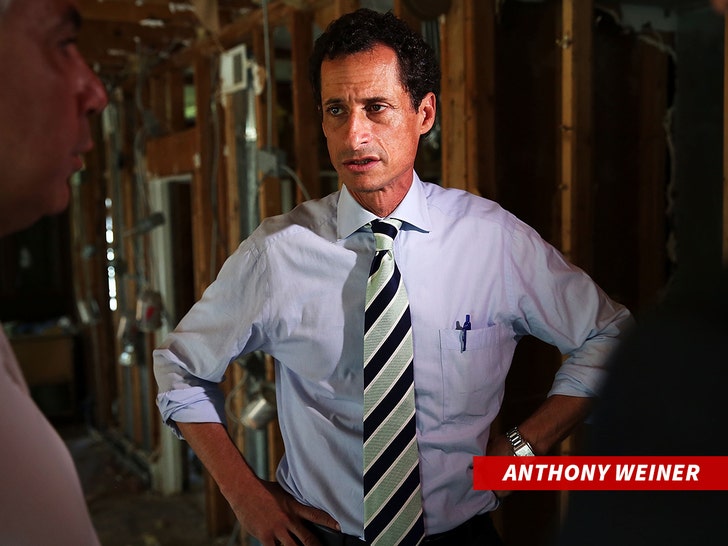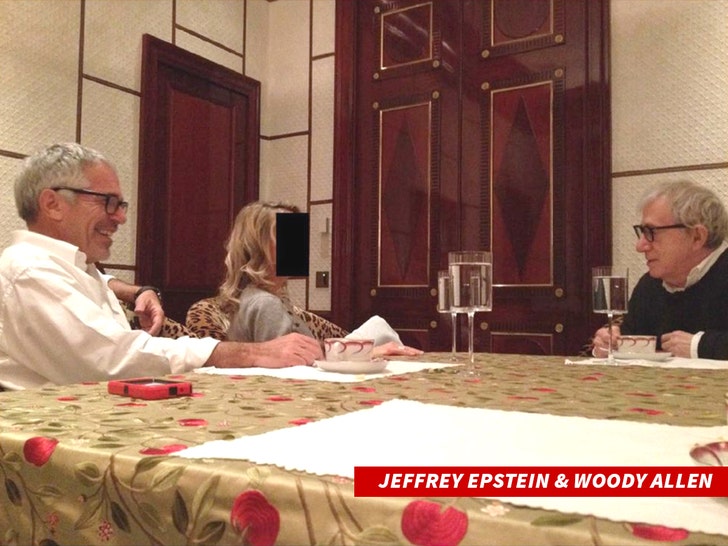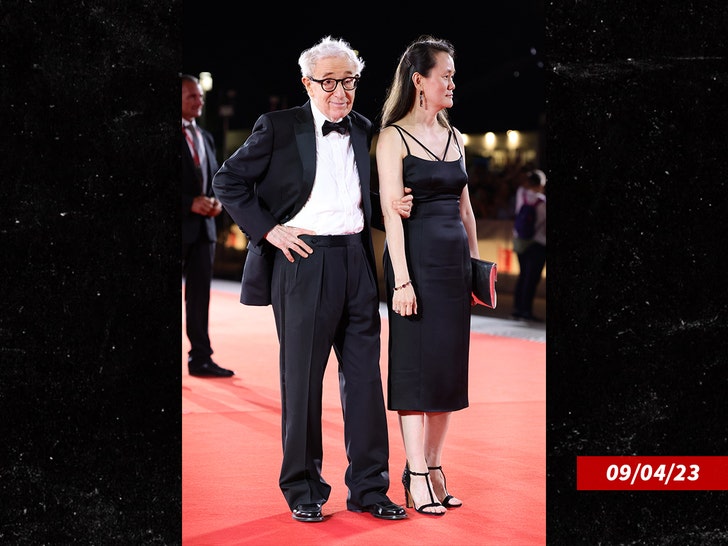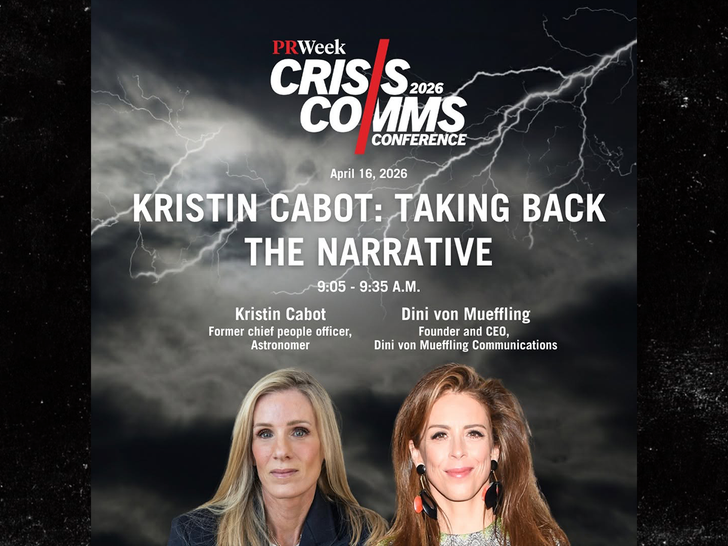Entertainment
Days of our Lives Early Spoilers Feb 9-13: Philip Delivers Stunning News & Cat Makes Power Play

Days of Our Lives spoilers for February 9th – 13th reveal Philip Kiriakis (John-Paul Lavoisier) stuns somebody and Cat Greene (AnnaLynne McCord) is making a really big move.
As we always do on early edition day, we start with what’s coming the rest of this week and then we’ll dive into what is coming next week.
Phillip Stuns Gabi on Days of Our Lives
On Wednesday, February 4th, we’ve got Gabi Hernandez (Cherie Jimenez) absolutely stunned by Philip Kiriakis. He may have a big romantic surprise up his sleeve. But will Gabi ever admit how she spied on Titan for Tony DiMera (Thaao Penghlis)? Or is Theo Carver (Cameron Johnson) going to drop that bomb to mess things up since he’s crushing on her?
Over in Alamainia, Rafe Hernandez (Galen Gering) and Eli Grant (Lamon Archey) get new info. Rafe found that tablet in Vivian Alamain (Louise Sorel)’s house in Alamainia, and Eli and Rafe are going to grill Vivian. I suspect she might have meant for them to find it because it wasn’t well hidden, and she knew they were going to search. She seemed unconcerned about them searching, so she’s going to tell Eli and Rafe a very convincing story about that.
Vivian Targets Dimitri on DOOL
Vivian may be throwing Dimitri von Leuschner DiMera (Peter Porte) under the bus as part of her scheme with Gwen Rizczech (Emily O’Brien) to take him down because, as we know, Vivian Alamain hates the von Leuschners and Gwen, in particular, hates Dimitri.
Liam Selejko (Hank Northrop) tells Abe Carver (James Reynolds) that he is so sorry. He had no idea that Theo was going to be kidnapped. Liam, according to him, thought he was prepping that crypt for some kind of doomsday crisis, like a bomb shelter, by stocking up on food and water. I’m not sure Liam Selejko’s telling the whole truth, though.
Gabi Hernandez Mourns Stefan DiMera and Drama at Bayview
On Thursday, February 5th, we’ve got Rafe and Arianna Hernandez Horton (Marissa Reyes) comforting Gabi. It looks like Rafe and Eli leave Alamainia convinced that Stefan DiMera (Brandon Barash) really is dead. If they tested the remains, it looks like they got a DNA match.
Of course, Gabi told Philip that she was over Stefan, but being confronted with the truth of his death is going to be something else because that was her guy. That was her person, and they really got cheated by Vivian.
Sophia Choi (Rachel Boyd) and Holly Jonas (Ashley Puzemis) are playing nice over at Bayview in front of Dr. Gregory. Sophia’s going to write Holly a much nicer note this time that doesn’t say she hates her. Everything seems less contentious. Sophia may be playing nice so that her minders at Bayview will relax their guard and she can escape again.
Rafe Grills Kristen on Days
Rafe circles back around to question Kristen DiMera (Stacy Haiduk). And I wonder if it’ll be about what they found out in Alamainia about the CCTV on the crypt or if it’s about her working with him to take down EJ DiMera (Dan Feuerriegel). Maybe a little bit of both. Brady Black (Eric Martsolf) needs Tate Black (Leo Howard)’s help to get through to Rachel Black (Alice Halsey), and this could be about steering clear of Sophia Choi,
or it could be about what happened with Rachel in the judge’s chambers. We may just get a play-by-play after the fact to find out what happened and if she’s been sentenced to an indefinite stay in Bayview. Obviously, Kristen was thinking she could just bring her home, but I don’t think it’s going to go that way because we know that Alice Halsey has her last episodes coming soon because she has left Days of Our Lives.
Stefano DiMera Memorial and EJ DiMera’s Rise to Power
Friday, February 6th, Chad DiMera (Billy Flynn) wants EJ and Kristen to just tap the brakes and stop their bickering so they can have some family unity for just a moment—long enough to bury their dad, Stefano DiMera (Joseph Mascolo). I guess they’re going to inter ashes, and we’ll see if they put him back in the crypt or if they’re going to do something else with him.
Tony DiMera (Thaao Penghlis), Chad, EJ, Kristen, and Theo are all definitely on the lock for Stefano DiMera’s memorial at the DiMera mansion. We may also see Gwen there, along with Roman Brady (Josh Taylor), Kate Roberts (Lauren Koslow), Marlena Evans (Deidre Hall), and Susan Banks (Stacy Haiduk). I know Anna DiMera (Leann Hunley) is supposed to be back this week, so she may be there, or they may just show up for the after-party.
Obviously, the family’s not partying, but I know Roman is probably ready to throw a big after-party. He and Marlena have a moment this week that upsets Kate. We also have Abe stunned by a request from Theo. I wonder if this has anything to do with Liam or Stefano’s memorial. Does Theo actually invite Abe? That is the last place he’d want to be.
EJ the DiMera Patriarch on DOOL?
At the memorial, EJ says that despite Stefano’s flaws, he did love them all. EJ promises they will not let the House of DiMera fall. It looks like Stefano’s infamous Phoenix ring may be going on EJ’s finger as he takes his place as the patriarch, even though he’s not the oldest. I think he’s the oldest biological child who is in the country and not on the run from the law.
Johnny DiMera (Carson Boatman) gets a warning from Chanel Dupree (Raven Bowens), and it may be to not let Stefano’s death make him vulnerable to EJ. Plus, he’s telling Johnny that he’s excited that Chanel is carrying a DiMera, but it sounds like those are fighting words because Johnny says he already has a son who’s a DiMera. It would seem strange for EJ to not count Tate as a real DiMera when he considers Tony a brother and Kristen his sister.


Valentine’s Day Romance and Shocking Decisions in Salem
The week of February 9th through the 13th, we are deep into February sweeps. We’re going to see Stephanie Johnson (Abigail Klein) and Alex Kiriakis (Robert Scott Wilson) soon decide something surprising about their nuptials. They put out the press release that they were going to elope, but it sounds like in the midst of all this drama with her stalker, Stephanie and Alex decide that they don’t want to wait. There’s no time like the present.
Speaking of romance, Brady and Sarah Horton (Linsey Godfrey) decide it’s game on. They’re going to be together and they’re going to date despite Xander Cook (Paul Telfer) not being happy and despite the Kristen and Rachel issues they know will come with this.
Gabi & Philip Head to Miami on Days of Our Lives
Gabi and Philip are going to be heading to Miami. That may be what Philip stunned Gabi with—a surprise getaway for Valentine’s Day. Speaking of V-Day, Steve Johnson (Stephen Nichols) and Kayla Brady (Mary Beth Evans) are celebrating their wedding anniversary. They’ve been married a few times, like a good soap couple.
Jennifer Horton (Melissa Reeves) and Jack Deveraux (Matthew Ashford) are still in Salem; they’re going to be reminiscing and romancing. Paulina Price (Jackee Harry) and Abe Carver celebrate Valentine’s Day, but this may be their last good time since Lexie Carver (Renee Jones) may be back from the dead soon, which could put a nail in the coffin of Paulina and Abe’s marriage.
Ari gets a kiss from hunky bad boy Liam soon, and I’m guessing that Gabi is really going to hate that. Doug Williams III was enough of a bad boy, but Liam seems worse. He has the extra baggage of the dead ex, the single dad stuff, and then he’s a criminal—an illiterate criminal. His reading is getting better, though, so at least Abe’s got that sorted out for him.
February Sweeps: The Stalker Strikes and Vivian Alamain’s Next Scheme
We’re also going to find out more about whether Vivian faked out Eli and Rafe with different remains. She might have had Jake DiMera (Jake Lambert)’s remains put in that coffin because, as twins, they would have both tested the same. We only have three episodes of Vivian and then we’re going to have her off-screen with one-sided phone calls with Gwen on the Dimitri scheme.
EJ’s having a struggle. There are just a lot of things going on in his life, and that makes him very vulnerable for Cat to swoop in, get close, try to get info, and plant a kiss on him. Watch for Stephanie, Jada Hunter (Elia Cantu), Alex, and Steve to launch their plan to trap the stalker, but he’s way ahead of them. Owen Kent (Wes Ramsey) is going to snatch Stephanie from the hospital, and I expect that’s coming during February sweeps.
Entertainment
Paeka Brings Peak Girls’ Day Energy as Celeb Host


TMZ.com
Another weekend, another TMZ Brunch Tour … and if you thought a pre-Valentine’s girls’ day couldn’t get any girlier, Paeka said hold my pink drink!
Our Grammy Sunday brunch turned into a full-blown red carpet on wheels, with celeb content creator Paeka showing up pretty in pink and absolutely owning hostess-with-the-mostest duties by becoming the first celeb host to livestream the entire Brunch Bus.
The tour was co-hosted by DJ Coach West, and the crew bounced around L.A.’s hottest brunch spots, including The Henry and Beaches … where Paeka had everyone up, dancing, and fully locked into Beaches’ iconic drag show!
By the time we hit the grand finale at Saddle Ranch, things were officially off the rails. A bull ride AND a drag show on a Sunday afternoon? Yeah, we were all in!
If you’re feeling the FOMO — don’t. You can snag tickets and hop on the Brunch Bus chaos yourself!
Entertainment
Woody Allen’s Wife Sent Wild Emails to Jeffrey Epstein Supporting Anthony Weiner
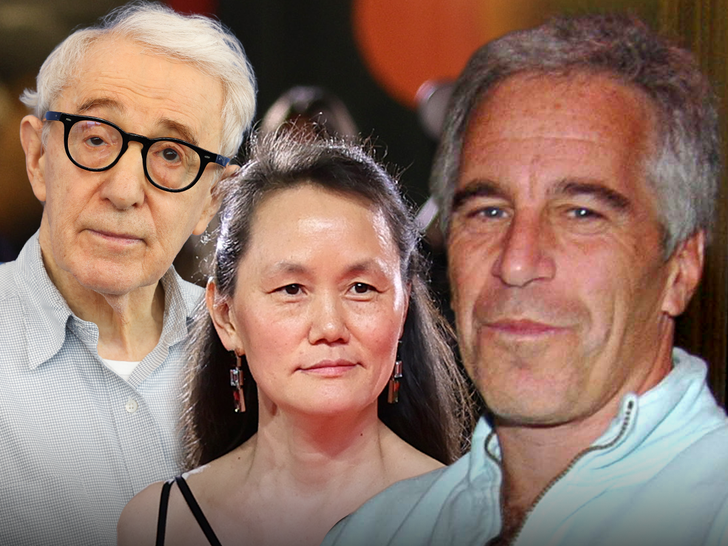
While most of the country was aghast at Anthony Weiner‘s relationship with a 15-year-old girl back in 2016, Woody Allen‘s wife, Soon-Yi Previn, seemed more disgusted with his victim … according to an email exchange with Jeffrey Epstein.
In just-uncovered messages — part of the millions of Epstein Files documents released by the Department of Justice — Soon-Yi calls the minor “a despicable and disgusting person.”
In one email, dated September 22, 2016, Soon-Yi writes … “I know. It’s an incredible story. You have to feel sorry for him. He can’t seem to learn,” referring to Weiner.
Then she takes a turn, going right at the underage female involved, writing … “I also thought it was disgusting what the 15-year-old did to him.”
She continued … “I hate women who take advantage of guys and she is definitely one of them. She knew exactly what she was doing and how vulnerable Wiener was and she reeled him in like fish to bait.”
According to Soon-Yi, the poor girl was “sick” for having “done this to him” and “should be ashamed of herself.”
While it’s shocking anyone could feel like that, somehow it’s not as earth-shattering coming from Soon-Yi.
As you know … she’s been married to Allen — her adopted mother Mia Farrow‘s ex-husband — since 1997, when she was 27, and he was 62. They first met when Soon-Yi was just 10 years old.
Weiner, a former congressman, was sentenced to 21 months in federal lockup for transferring obscene material to a minor.
We’ve reached out to Allen for comment. So far, no word back.
Entertainment
Bold and the Beautiful: Taylor & Deacon Start Forbidden Romance Behind Everyone’s Back?!

Bold and the Beautiful has Taylor Hayes (Rebecca Budig) and Deacon Sharpe (Sean Kanan) determined to be together despite the fact that Steffy Forrester (Jacqueline MacInnes Wood) just hit Taylor with a heartbreaking ultimatum.
Bold and the Beautiful: Deacon and Taylor Tangle
So, last week we saw Deacon Sharpe and Taylor Hayes professing their love to each other and they shared a passionate kiss. Deacon thinks he and Taylor are meant to be together and she agrees. They talked again with Deacon reiterating that he’s ready to leave Sheila Carter (Kimberlin Brown) to be with Taylor.
And then we saw Taylor telling Steffy Forrester that she and Deacon can’t deny their feelings anymore and they want to be together. Of course, Steffy freaked and she told Taylor this can’t happen. Then Steffy took things further and told Taylor that if she’s with Deacon, that’s a deal breaker.
Steffy said Taylor’s not just putting herself in danger, she’s putting Steffy and the kids in danger because Sheila will come after them all. She will lash out if Deacon leaves her. So Steffy told Taylor, “If you start seeing Deacon, I will cut you out of this family.” Of course, that horrified Taylor.
Deacon and Taylor Vow to Fight for Their Romance on B&B
But spoilers for this week confirm that Deacon and Taylor vow to find a way to be together and they share another kiss. So, they’re not going to give up. While Steffy was raging at Taylor, we had Deacon trying to low-key bring up divorce to Sheila. What didn’t help was that when Deacon was trying to talk to her, Sheila had that giant hatchet knife that she was using to chop up fish.
So, Deacon’s trying to ease Sheila into the idea of divorce, talking about what a good person she is now and how much she’s changed, whether or not they’re together. But the only problem is basically what Deacon did was he put Sheila on high alert and she’s going to be suspicious. Meanwhile, Taylor and Deacon are very intent on being together because they are in love. Steffy’s ultimatum is a problem and so is the fact that Deacon is pretty much scared of Sheila.
A Secret Affair and the Search for a B&B Love Nest
I suspect that Deacon and Taylor are going to start a secret affair while they figure out how to make sure Sheila doesn’t come unhinged and doesn’t start hurting people that she loves. And of course, Deacon and Taylor could always wait to be together and they could be patient, but I doubt we’re going to see that, especially because we’re in February sweeps.
I think Deacon and Taylor are going to keep seeing each other. They’re going to keep smooching and I think they’re going to do even more than that. I think we’re on a countdown to seeing them getting intimate, but Deacon and Taylor need some place to be together because they definitely can’t go to his place. Deacon lives with Sheila and they can’t go to her place because Taylor lives in Steffy Forrester’s guest house and she has hit her with that ultimatum.
So, I suspect Taylor and Deacon are going to get themselves a little love nest somewhere they can sneak off and be together. Because as of now, the only way for Taylor to be with Deacon is to sneak around. Until they can figure out how to get Sheila to calmly accept that Deacon doesn’t want to be with her, they either have to stay away from each other or they have to creep around and develop this relationship in secret.
Protecting Taylor Hayes from Sheila Carter’s Revenge on Bold and the Beautiful
Taylor and Deacon also need to meet in secret to strategize on how to get him extricated from his marriage to Sheila without her trying to kill Taylor or Deacon or both him and Taylor. I don’t think Deacon is patient enough to wait to be with Taylor, but at the same time, he doesn’t want her to be at risk.
Official 2026 Bold and the Beautiful spoilers said that Deacon is very intent on protecting Taylor from Sheila and the potential risk that she might go nuclear and want revenge on Taylor for taking her man. Of course, if Deacon can find a way to peacefully divorce Sheila, then Steffy may reconsider the ultimatum.
But as of now, I can see why Steffy’s right not to trust Sheila. I don’t think there’s any way to stop her from going bat crap crazy if Deacon tells her he wants a divorce. That’s bad enough. But to make it worse, if he tells Sheila he’s in love with Taylor and wants to be with her, that’s going to be a huge problem because Sheila is giving Taylor the credit for saving their relationship.
Hope Logan and Brooke Logan Join Team Taylor and Deacon on Bolf
And even worse, if Deacon brings his kids into this and says, “Look, part of the issue is my kids don’t want you around Sheila but they totally approve of me being with Taylor.” I mean, that is going to hit Sheila twice as hard. And in the end, I don’t think there’s any stopping the train wreck that’s coming. But Taylor already said she’s willing to take the risk and she isn’t afraid of Sheila.
And flat out, Taylor said she’s not going to live in fear, but she can’t do anything about Steffy’s fear, which is tangible and justified. So, she and Deacon are definitely going to pursue their relationship, and they need time alone so that they can bask in these newfound feelings and sort out the Sheila situation.
So, they need a love nest, and I’m wondering where that’s going to be. Bold has an unused set that they could remake into a romantic little hidey-hole where those two can be together. Do you remember Luna Nozawa (Lisa Yamada)’s little apartment? I think that would work. That’s a set they’ve got built and on hand and was used recently.
Finding a Secret Hideout on The Bold and the Beautiful
The problem with a hotel room is that would leave a money trail unless it was some little ratty cash-only place. But B&B has a set for that, too. Do you remember that icky little hotel where Eric Forrester (John McCook) and Quinn Fuller (Rena Sofer) used to meet before they were publicly outed in a relationship? Then again, Taylor could take a page from Bill Spencer (Don Diamont)’s playbook and have a naughty little sex room built next door to her office.


Hope & Deke Support Secret Romance on Bold and the Beautiful
Taylor and Deacon could also just lock the door and get busy on her shrink couch, but anybody could catch them there, including Steffy or Sheila. I think Hope Logan (Annika Noelle) and Deke Sharpe (Harrison Cone) would actually help them as much as possible. They might even run interference so that Deacon could sneak around to be with Taylor
We know that both of Deacon’s kids want him to leave Sheila and they very much want him to be with Taylor instead. I also think that when Hope hears that Steffy gave Taylor this ultimatum and threatened to cut her out of the family, I could see Hope doubling down to help Deacon and Taylor on the sly.
This week, Steffy’s going to go tell Ridge Forrester (Thorsten Kaye) that Taylor has feelings for Deacon. I’m sure Ridge is going to be outraged and he’ll tell Brooke Logan (Katherine Kelly Lang). But I think Brooke would support Taylor being with Deacon. Brooke might also try and help get through to Steffy and help Deacon find a way to get Sheila to accept a divorce without getting violent.
Will Deacon & Taylor Survive the Sheila on B&B?
One thing we know for sure is that Deacon and Taylor are very happy to have found each other and they are falling in love. They’re already saying, “I love you.” I think they could have a really good life together. But Sheila is the primary and most terrifying obstacle to this relationship.
If they can deal with Sheila and get her to accept things, I think that Steffy would drop the whole deal about cutting her mom out of her life. In the meantime, I expect to see Deacon and Taylor sneaking around and finding some place where they can be together without prying eyes seeing them.
Wait to see if they find a little love nest all of their own. It is February sweeps, so I’m expecting them to find some place with a bedroom and they’re going to hit the sheets.
Entertainment
GloRilla Slammed By Sister For Neglecting Mom And Siblings

Roommates, some heavy family tea is spilling about GloRilla and her relationship with her loved ones. While the rapper has been making waves in the industry and building a name for herself, her sister Victoria Woods is now speaking out about what she claims has—or hasn’t—been done for their family.
RELATED: Clocked It! GloRilla Claps Back After Trolls Criticize Her Viral Bare-Faced Video (WATCH)
GloRilla Accused Of Leaving Her Family Hanging After Fame
In a video circulating online, Victoria Woods, also known as Scar Face Woods, reveals that their mom is still clocking in at FedEx. She also claims that GloRilla hasn’t contributed to household expenses since her rise to fame. Scar Face pointed out that GloRilla has 10 siblings she hasn’t helped financially but allegedly has supported friends along the way. And, she didn’t hold back referencing a viral video that showed GloRilla buying their father a Jaguar, claiming that while it was a flashy gift, it didn’t even have gas and that the parents still require financial assistance.
Additionally, Scar Face stressed that GloRilla doesn’t publicly acknowledge the family support they still need, leaving fans and followers talking. While GloRilla hasn’t publicly responded to the allegations yet, the post has already sparked online conversations, with fans debating the responsibilities, if any, that come with fame—and whether family obligations should come first.
So… What Else Did She Say?
Taking to Facebook, GloRilla’s sister Scar Face Woods seemingly aired out the rapper even more. From detailing their parents’ money struggles to their upbringing and even their autistic brother, Victoria Woods went IN on GloRilla. She wrote:
“I’ll Really Go Live And Expose Yall Favorite Rapper!! Same Mom, Same Dad, 10 Siblings!! Yall Think she this upright a** person when she really not ain’t fwu since she got on and I’m constantly getting acknowledgment for being her sister and she ain’t fwu at all Gloria Woods call my bluff it’s been 4 years why the media haven’t seen your siblings? And don’t say cause you protecting us cause we still in Memphis it’s cause you talk about our struggles and you don’t fwu!! !! na let’s clock it”
In another post, she added:
“And our parents are not straight!! Our dad just borrowed 100$ from our mom yall think yall know shit but don’t !! I had to give my mom 1800$ on a 2400$ rent cause Yall favorite rapper blocked her !! Im tired of being quiet!!!!”
And she continued, calling attention to their siblings’ living conditions:
“…Not finna put our autistic brother on here it’s 10 !! ion gaf about how yall put it she ain’t gave none of the ones she struggled with SH*T! !Same house with [rats] and [roaches] sleeping on busted air mattresses taking baths outta water bottles when our parents couldn’t make ends meet she’s Wrong no matter how yall put it”
GloRilla Caught In Family Tea, Fans Drag Hard
As soon as the drama broke, fans ran straight to TSR’s Instagram comment section to share their two cents. Some defended GloRilla, saying she doesn’t owe grown family members financial support. While others insisted there’s probably more to the story than what’s being shared. Of course, countless people also took the sister’s side, saying that no matter what, the family would be living it up alongside her if she wanted to help.
One Instagram user @heyimdeo commented, “She don’t have to support yall! TF!“
This Instagram user @kingbarbieee_ said, “If I get as much money as glo my mama ain’t working no where now my siblings is different but my mama daddy n granny I’ll die bout it“
And, Instagram user @skinnynene___ added, “My mama and siblings won’t struggle if I make it period idgaf“
Meanwhile, Instagram user @itsjasleeee shared, “Maybe yall didn’t support her dream ? Idk but she always said her friends stuck by her and gon ball with her so 🤷🏽♀️”
While Instagram user @dramaqueenb__ asked, “Ok the mom still working at fedex is crazy a little thou , no ?“
Then Instagram user @carmensangel said, “I’m on the side of I don’t have to take care of grown ppl 🤷🏽♀️ I worked hard for my accomplishments ain’t gon just mooch off me.“
Finally, Instagram user @trinidadrell commented, “Wish my family would when the time comes 😂😂😂”
RELATED: Toosii Opens Up About His Mental Health While Adjusting To Being An LSU Student (VIDEO + PHOTOS)
What Do You Think Roomies?
Entertainment
Coldplay Couple’s Kristin Cabot Is Keynote Speaker at Crisis PR Conference

Coldplay Couple’s Kristin Cabot
Cashes In At Corporate Conference!!!
Published
Kristin Cabot — one half of the couple who went viral on social media this summer when they were caught getting cozy at a Coldplay concert — is the keynote speaker at a crisis PR conference in D.C. … where tickets are going for $875.
The former “chief people officer” for Astronomer will share the stage with PR pro Dini von Mueffling for a 30-minute discussion titled “Kristin Cabot: Taking Back the Narrative.”
It’s part of PRWeek’s Crisis Comms Conference and tickets to the April event range from $750 to $875 … with 14 other speakers scheduled to grab the mic.
Kristin has a recent crisis PR experience to lean on … she resigned from her cushy job after being caught on the kiss cam at a Coldplay concert snuggling up to her boss, Astronomer CEO Andy Byron.
Grace Springer via Storyful

7/16/25
While Kristin was separated from her spouse, the internet did not know that — and she was also immediately labeled a homewrecker. She recently blamed the ordeal on alcohol and told the New York Times she was stalked by paparazzi, receiving 500 or 600 calls a day, and received dozens of death threats after the incident unfolded.
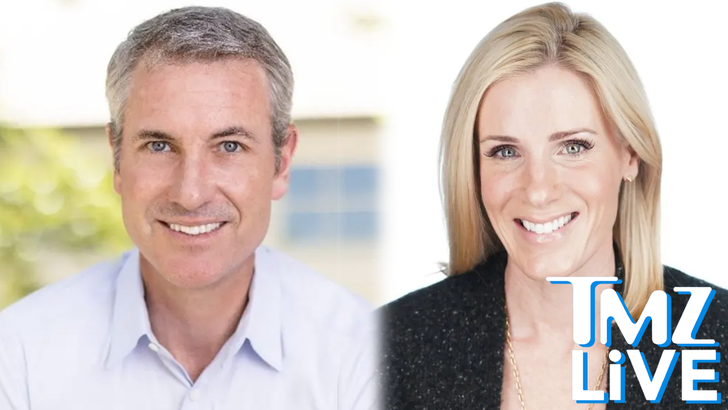
TMZ.com
When describing Kristin’s speaking gig, the conference’s website states … “Cabot experienced firsthand the extremity of public shaming that women have long experienced when in the negative spotlight of the media, one their male counterparts often seem to avoid. During this session, the former Astronomer chief people officer and her PR representative, industry legend Dini von Mueffling, share the strategy — both immediate and long-term — that has helped Cabot take control of her narrative and rewrite her story.”
Folks who shell out big bucks to attend will learn how to “pivot at a moment’s notice for unexpected occurrences that are now the norm, not the exception.”
Entertainment
10 Animated Movies That Are 10/10 but Nobody Remembers

An animated movie gets labeled underrated all the time, but most of those picks are just popular films that people want to sound special about. This list is different. These are the ones that feel quietly perfect and still somehow slip through the cultural cracks, even though they play like total classics. They’re not that popular either. You might not have heard about most of these.
Each pick is a clean 10 out of 10 for me because the craft disappears, and you just feel the story working. Some are funny, some are heavy, and a couple are downright strange, but every one of them has real staying power once you finally press play. So if you’ve been hunting down an animated 10/10 watch, lock in.
10
‘April and the Extraordinary World’ (2015)
April and the Extraordinary World is a pulp adventure that hides a surprisingly sharp idea inside its fun. In this version of history, science keeps vanishing, so Paris feels stuck in a smoky, steampunk limbo while a teen, April Franklin (Marion Cotillard), chases the truth behind her parents’ disappearance. The movie earns your attention fast because every invention feels practical, and every chase has stakes.
As it escalates, it never forgets the emotional core, which is April choosing curiosity over fear. There is a clean sense of momentum to the mystery, and the villains stay unsettling without turning cartoonish. By the time the finale clicks, the story feels complete rather than overexplained, and you realize it pulled off a big, strange premise with real control. It’s a good watch for both children and adults.
9
‘The Red Turtle’ (2016)
The Red Turtle barely uses dialogue, yet it still tells a full life story with clarity. A castaway washes up on an island and keeps trying to escape, until a red turtle blocks him in a way that feels maddening, then meaningful. The film turns survival into a relationship with place, time, and consequence.
What makes it linger is how it keeps changing shape while staying simple. There is no wasted emotional noise, just images that do the work and transitions that feel earned. It’s a 10/10 because it proves animation can hold an entire human life in a handful of images, and somehow make it feel more real than dialogue ever could.
8
‘Tokyo Godfathers’ (2003)
This film starts as a messy night out and turns into a chain of plot turns that never stops paying off. Tokyo Godfathers follows three homeless friends who find an abandoned baby, and instead of treating it like a cute gimmick, the movie forces them to follow the baby’s trail through Tokyo’s backstreets, debt, family secrets, and bad luck. Hana (Yoshiaki Umegaki) keeps the group moving with stubborn warmth.
The magic is that every “coincidence” hits like life, not writing (and that’s a major problem with most animated films). It is directed by Satoshi Kon, who seems to have kept that feeling checked. The film, therefore, keeps the pacing sharp like a thriller but never loses the bruised humanity underneath the jokes. It’s funny in that painful way where you laugh and immediately feel something catch in your throat. And by the time all the threads collide, you realize the movie wasn’t just about finding where the baby belongs, it was about watching these three people accidentally find their way back to themselves.
7
‘Persepolis’ (2007)
Persepolis is so different. It looks simple on the surface, yet it carries enormous emotional weight without ever getting stiff. It follows Marjane (Chiara Mastroianni) growing up through the Iranian Revolution and its aftermath, and the story keeps focus on what that does to a kid’s identity, friendships, and sense of safety.
That whole premise makes it an excellent film, giving it that rewatchability factor for anyone who clicks with the themes, and how it refuses to flatten anyone into a symbol. You get clear personal stakes in every phase, from teenage rebellion to exile loneliness, and the film never pretends those phases are neat. Any child who feels the same things in their life ends up loving it.
6
‘Fantastic Planet’ (1973)
There are animated films that feel whimsical, comforting, even playful, and then there’s this strange, unnerving sci-fi fever dream from 1973 that seems designed to make your skin crawl in the best possible way. Fantastic Planet drops you onto a distant world where humans aren’t heroes or explorers, but tiny, disposable creatures treated like pets (or pests) by towering blue beings called Draags.
From the very first minutes, the movie radiates imbalance. Everything is off-kilter: the scale, the power, the cruelty baked into everyday life. Terr (Jean Valmont), the human who escapes captivity, isn’t framed as some shiny savior figure. He’s just surviving, learning, resisting, and the film refuses to turn his struggle into a simple fantasy of triumph. The ending doesn’t wrap things up with some satisfying overthrow or blood-soaked payback. Terr doesn’t defeat the Draags. Nobody wins, nobody is redeemed, and that’s why it sticks.
5
‘Millennium Actress’ (2001)
Millennium Actress makes memory move like cinema itself — fast, fluid, impossible to hold still. A filmmaker interviews retired legend Chiyoko Fujiwara (Miyoko Shōji), and her answers don’t arrive as neat recollections. They explode into scenes: her life collapsing into the roles she once played until the boundary between performance and reality stops mattering.
The film jumps across centuries, wars, and romances with dizzying speed, but it never loses its center. Everything is anchored to Chiyoko’s longing, that single emotional current pulling her forward. It qualifies as a 10/10 for me because it frames love not as something she ever has, but something she is always moving toward. The story becomes a chase stretched across an entire lifetime — not for a man exactly, but for the feeling of pursuit itself. By the end, it appears that the blurred timelines were the only honest way to show what she spent her life running after.
4
‘The Secret of Kells’ (2009)
The Secret of Kells feels like a story carved into illuminated manuscript pages and then brought to life. The plot follows Brendan (Evan McGuire), a young monk in a fortified abbey, and his world is ruled by fear of invasion and strict boundaries. And once he meets Aisling (Christen Mooney), the film shifts into a quest where art becomes the thing worth risking everything for.
The movie stands out because it commits fully to its visual style. Inside the abbey, everything looks stiff and controlled, straight lines, tight spaces, repeated shapes, which match how Brendan’s life is ruled by rules and fear. Once he goes into the forest with Aisling, the animation changes. The backgrounds get looser, filled with curves and swirling patterns, like the world is opening up. The design is taken directly from the real Book of Kells: flat perspective, heavy outlines, and decorative detail packed into every shot. That’s why the film doesn’t feel like a typical fantasy cartoon.
3
‘A Scanner Darkly’ (2006)
A Scanner Darkly uses rotoscope animation to make paranoia feel physical. Bob Arctor (Keanu Reeves) is an undercover cop sinking into addiction while spying on his own friends, and the film never gives you a safe viewpoint. Every conversation feels slightly off, like you are listening through a damaged wire. Donna (Winona Ryder) might be honest, or she might be another angle.
What makes it stick is how it turns comedy into discomfort. The group’s jokes have real nervous energy, and the story keeps tightening until Bob cannot tell what he knows anymore. When the final reveals land, they are brutal because they are quiet, and the movie makes you sit with the cost instead of dressing it up.
2
‘Ernest & Celestine’ (2012)
Ernest & Celestine is one of those rare kids’ films that feels genuinely kind. Celestine (Mackenzie Foy) is a young mouse raised on the idea that bears are basically monsters, and Ernest (Forest Whitaker) is a broke, hungry bear who looks scary on paper but is basically just exhausted and decent. Their friendship doesn’t just “challenge society” in some vague way, it pisses off an entire world built on fear and tradition.
What I love is how calm the movie is about its message. It doesn’t do big speeches or melodrama. The prejudice is baked into everything: the courtrooms, the rules, the way crowds immediately turn cruel. And the softness of the watercolor animation makes that harshness hit harder, because the world looks gentle even when it’s being unfair. The movie feels like watching two outsiders accidentally expose how ridiculous the whole system is, just by refusing to play along.
1
‘Song of the Sea’ (2014)
Song of the Sea is one of the most emotionally wrecking animated films that somehow still looks like a bedtime story. It follows Ben (David Rawle), an angry, shut-down kid who is carrying grief like it’s poison, and Saoirse (Lucy O’Connell), who is quieter, almost otherworldly.
What makes the film work so well is how tightly the fantasy connects to the family’s emotions. The folklore animation is the movie’s way of showing sadness, memory, and healing without spelling everything out. The story itself, setting off on a quest to liberate the fairies and protect the spirit world from the forces of evil, is just beautiful and makes it an ideal watch for children. It’s like Spirited Away, but at a low heat.

Song of the Sea
- Release Date
-
December 10, 2014
- Runtime
-
93 Minutes
- Director
-
Tomm Moore
- Writers
-
Will Collins, Tomm Moore
Entertainment
Young and the Restless: Nick’s Addiction Destroys Everything – 5 Devastating Consequences Ahead

Young and the Restless gives Nick Newman (Joshua Morrow) struggling with pain every day. He’s not being honest about the extent of it, and he may be headed down the dark and scary path of addiction.
Nick’s Current Struggle on Young and the Restless
Not too long ago, Sharon Newman (Sharon Case) took Nick back to the doctor and they wrote him a refill on his pain pills. That’s a good thing because after he ran out of the prescription meds and he was still in pain and was raging—I think in part because of the pain—he did consider taking one of Matt Clark’s (Roger Howarth) fentanyl pills, but he didn’t.
Then Sharon helped him get a legitimate refill. So, for now, even though Nick is still in a lot of pain from breaking his leg and the surgery, at least he’s got one bottle of legal pain meds that he can still go through. But that refill is going to run out, especially with him taking more pills than he should. And then what happens? The doctor’s not going to keep refilling the opioids. That’s not what doctors do anymore.
Nick Newman’s Breaking Point: Will Pain Pills Lead to a Y&R Addiction Storyline?
We can all see that Phyllis Summers‘ (Michelle Stafford) and Cane Ashby’s (Billy Flynn) attack on Newman is really stressing Nick out. The threat of Matt Clark had been upsetting him, especially since he’s to blame for the car crash that broke Nick’s leg that required the surgery in the first place. Also, I don’t think Matt Clark is done.
We’re in February sweeps and they exited him off-screen. That would be insanely bad writing and a big miss for ratings. So, we’ll see. But we’ve also always seen that Nick’s got a short temper. He always has, but it’s gotten even shorter lately. Like when he was arguing with Phyllis about her teaming up with Cane and using the AI to take everything from Victor Newman (Eric Braeden) and the other Newmans.
Then, Noah Newman’s (Lucas Adams) planning to leave town with his much older lover, Sienna Bacall (Tamara Braun). Sharon is spiraling because she just found out Mariah Copeland (Camryn Grimes) kidnapped Dominic Chancellor (Ethan Ray Clark) and ran off with him. So all of this is going to have Nick stressed out. That’s going to aggravate his pain, and I think that one bottle of pills he got is going to go really fast.
Fentanyl and the Newman Family: The Dangerous Path to Illegal Drugs on Young and the Restless
From there, I think it’s feasible that Nick may turn to fentanyl or some other illegal drug once the doctor cuts off the legal pain meds. If he wasn’t going to take the drugs that Matt Clark gave him, I think Nick would have already flushed them or tossed the bag out, but he didn’t.
I think one tablet of fentanyl may be enough to get Nick hooked given the addiction gene that runs in the Newman family. So, we’re going to talk about some of the bad outcomes if he does pop those illegal pills that Matt Clark gave him. The road to addiction could lead Nick to some very bad places.
First of all—and this would be a terrible thing to do—we could see his judgment so askew that Nick goes and winds up in bed with Phyllis. Obviously, she and Cane are going to crash and burn because he’s still in love with Lily Winters (Christel Khalil), and he already told Billy Abbott (Jason Thompson) that what he’s got going on with Phyllis is not love.
Manipulation and Betrayal: Nick and Phyllis’ Complicated History on Y&R
This week, Victor tells Cane that he’s got Lily and the twins and he’s trying to scare Cane into stopping the Newman takeover. If that works and Cane backs off, I think Phyllis is going to turn on Cane in a heartbeat. And I think Phyllis will try and continue the Newman takeover plot on her own.
Nick might think that he can outsmart her, get close to Phyllis, convince her to stop, and try and use her feelings for him to shut her down. But if Nick’s on drugs, his judgment’s not going to be the best and he might mess up while trying to manipulate Phyllis. You know, Nick has a long, complicated history with Phyllis.
And yes, she is a train wreck, but she’s also been in love with Nick for a long time. At one point, he loved Phyllis. And if he’s deep in the throes of addiction, I think Phyllis might get the chance to sink her claws into him again. And that leads us to the next possible disaster to talk about.
The End of Shick? How Addiction Could Ruin Nick and Sharon’s Young and the Restless Reunion
The second thing is that Nick may screw up things with Sharon. She and Nick were on their way to a reunion. They shared a couple of kisses and they talked about reuniting and it seemed to be that they agreed on it, but then nothing happened. It’s not even a slow burn for Sharon and Nick at this point. It’s a no burn. There’s not even a simmer of action happening between them.
It’s like Josh Griffith hates the idea of writing anything romantic for Nick and Sharon. Or maybe he just forgot. I don’t know how to explain the fact that he just abruptly dropped it. If Nick spirals into addiction, I think fans of him with Sharon may never get the real reunion they were hoping to see at last.
Now, I will say if Nick is struggling with addiction, I think that’s something Sharon can handle and help with. But if Nick gets too close to Phyllis, that could be a dealbreaker. I think Sharon would be absolutely disgusted if Nick tangled with Phyllis after what she’s done to his family.

Violence and Rage: The Dark Side of Nick Newman’s Hot Temper on Y&R
Over and above Nick being with Phyllis, if Nick’s not thinking clearly, he might fall in bed with random women. Maybe strangers, maybe chicks he meets while out looking for street drugs. I think that would be something Sharon couldn’t handle or tolerate. Another thing we could see if Nick falls into opioid addiction is he could turn really violent.
I mean, Victor’s son is already a hothead and Nick has a tendency to punch first and think about it later. So, he might get physical with Cane because he’s already eager to give him a beating. That could get him arrested. Nick might snap at Sharon. There’s no telling who Nick might let loose on.
I don’t think he would physically hurt Sharon, but he may throw things around and scare her. Even without pills in his system, I mean, we know Nick got a terrible temper. He’s been like that for years. So, I would expect more anger, more rage, and him maybe smacking some people around.
Nikki Newman and Jack Abbott: Confronting the Signs of Opioid Addiction
Another thing we might see is that if Nick’s getting hooked on painkillers, then Nikki Newman (Melody Thomas Scott) and Jack Abbott (Peter Bergman) may be the first ones to notice the signs of addiction. But I think if either of them approached Nick, I think he would lash out at them.
Addicts always get defensive. They deny they have a problem. And Nick might spew ugly things at his mom, Nikki, and snark about her sobriety issues, making her paranoid. You know, addicts can get really mean and they say stuff they wouldn’t otherwise.
I think Jack in the end could end up saving Nick if it goes down this road because Jack’s been addicted to pills. So, he really understands the struggle. But I think Nick would have to be pushed to accept help.
Ruining the Brotherhood: Nick and Adam Newman’s Fragile Bond on Young and the Restless
The last thing to consider if Nick gets hooked on drugs is that he may ruin his newfound brotherly bond with Adam Newman (Mark Grossman). They’ve gotten really close recently, but before that, Nick and Adam had years of rivalry, and we all know that drugs bring out the absolute worst in people.
So, Nick might start being a real jerk to Adam. And I think he might figure out that Nick is struggling, and I think Adam might actually try to help, but I think Nick would just lash out at Adam and say, “Oh, you finally have all of Victor Newman’s attention.” That kind of thing.
I think Nick’s going to lash out at a lot of people. Addicts usually turn on people they love. And Nick’s already snapping at Sharon, at Noah, and at Sienna. He’s threatened to get physically violent with Cane. He was threatening Phyllis. And that’s before Nick touched illegal drugs. If he pops a fentanyl, I think from there, all bets are off.
Entertainment
Days of our Lives: Theo Discovers Shocking Truth About Mom Lexie’s Death?

Days of Our Lives fans, we’ve got some big shockers coming for Theo Carver (Cameron Johnson). Now that he’s out of the hospital, the family felt like he was ready to hear that his grandpa Stefano DiMera (Joseph Mascolo)’s bones were the ones that they found in the crypt.
But there’s another huge secret lingering that’s been lingering for years. That’s the truth about the death of Theo’s mom, Lexie Carver (Renee Jones). We’re going to talk about why Theo’s been kept in the dark about his mom’s fate and how that is going to play into what’s ahead.
Theo Carver Leaves the Hospital Amidst Stefano DiMera Bone Discovery on Days of Our Lives
So, Theo’s finally out of University Hospital, but when Rafe Hernandez (Galen Gering) told EJ DiMera (Dan Feuerriegel) that it was Stefano’s bones in the crypt, Theo was still a patient. And he even said that the FBI made doubly sure they DNA matched those bones to both Chad DiMera (Billy Flynn) and EJ.
So they have all the certainty in the world those are Stefano’s bones. Chad was up at the hospital to see Theo, but he did not tell them about what the FBI found out. So, that left it to his dad, Abe Carver (James Reynolds), to tell Theo about Stefano’s bones.
And later, Paulina Price (Jackee Harry) and Abe both agreed that the truth about Stefano’s role in Lexie’s death would be just too much for Theo to hear at this point. But I think it’s going to come out anyway, especially since I’m increasingly certain that his mom, Lexie, is the lady in the test tube that Dr. Wilhelm Rolf (Richard Wharton)’s about to revive.
The Complex Bond Between Stefano DiMera and Theo Carver on DOOL
So, Days of Our Lives history tells us that Stefano and Theo did have a really close relationship. Stefano never had any issue about Theo being neurodivergent. He treated him with love, with kindness, and master chess player Stefano even taught Theo the game and they played whenever they could.
And that’s why he still loves the game even now was because of Stefano. So on the flip of that, Lexie tried to shield Theo from the dark side of Stefano. And Lexie often struggled with her own DiMera heritage and she occasionally engaged in sketchy behavior while defending Stefano and the DiMera family.
So, in the end, what Lexie had was a complex and loving but also a very strained relationship with her dad Stefano. She was good for him. I will say that Lexie brought out the softer side of crime boss Stefano.
Revisiting Lexie Carver’s Tragic Death in the DiMera Tunnels on Days
And later in her life, Lexie faked her death and she went into hiding. But then Andre DiMera (Thaao Penghlis) abducted her, if you remember your history. And from there, he stashed Lexie down in the toxic, fume-filled, infamous underground DiMera tunnels for many, many months.
And despite Andre snatching her, Lexie was eventually rescued and she was reunited with the family. But she had already been exposed to the toxins for way too long. And sadly, that’s why Theo’s mom developed inoperable brain tumors that took her life. If you were watching back then, you may recall that Stefano felt personally responsible.
He felt a lot of deep guilt about Lexie’s illness that finally took her life. And if it weren’t for all the DiMera family schemes and Andre’s actions, obviously Lexie would never have been down in the tunnels to be exposed to the toxic fumes. So while Stefano didn’t directly cause Lexie’s death, he did bring Andre into their lives and those were DiMera tunnels. So he had an indirect hand in it.
Lexie Carver’s Legacy and the Secret of Her Final Forgiveness on Days of Our Lives
And in the end, Stefano got Lexie’s forgiveness before she died. She told Stefano that she loved him. And then Lexie passed away peacefully in Abe’s arms. That was June 20th, 2012. She was just 46 and she left behind obviously her loving husband Abe and her young son Theo.
Lexie and Abe had conceived Theo after a long period of infertility issues. And if you were watching then, you know she was a devoted, loving, and fiercely protective mom. Lexie and Abe both advocated for their autistic son, and they always gave Theo the best life they could.
And then in Lexie’s final weeks of life, she spent as much precious and meaningful time as she could with Theo and Abe. And of course, losing his mother took a toll on young Theo. But Abe and everybody else in the family made sure to keep Lexie’s memory alive for him.
Is Dr. Wilhelm Rolf Reviving Lexie Carver in the Secret Test Tube?
All these hints about Dr. Rolf’s human test subject in the tube absolutely point to Lexie being back to the land of the living at long last. I suspect Stefano had Lexie frozen, kept her in cryostasis, and tasked EJ and Rolf to find a way to resurrect her and restore her to life since felt responsible for her death.
And that way, Theo could eventually have his mom back. But before Lexie is resurrected, assuming it is her in the tube, Theo may finally learn the ugly truth about his mom’s death and Stefano’s role in it. Now, recently, Abe and Paulina were talking about Stefano, Lexie, and Theo.
And Abe was wondering aloud if he should tell Theo the truth about Stefano’s indirect role in Lexie’s death. But Paulina shut that down and she said it could be really damaging for Theo to hear that. Basically, nothing productive could come of it and they should just let Theo keep the good memories of Stefano and his good memories of Lexie. And Abe agreed.
Abe and Paulina Struggle to Keep the Truth From Theo Carver on DOOL
But we all know from watching soap operas that if somebody works that hard to keep a secret hidden, that means it’s going to come out sooner or later and in this case many years later. So far, Theo’s extended family and friends have kept quiet because a lot of people know exactly why Lexie got sick and died. And Theo may find out the truth soon.
And you never know, he might hear it directly from Lexie if EJ and Dr. Rolf succeed in bringing her back from the dead. If you remember, Theo was just nine when he lost his mom and then later Days of Our Lives aged his character up. But at the time that Lexie passed, Theo was just an elementary school kid. So, I personally think it should be left to Lexie to explain how she got the tumor that killed her.

Stefano DiMera’s Memorial Could Reveal Explosive Family Secrets on Days
But with Stefano’s upcoming memorial, anything is possible. I don’t think anybody would say something deliberately to hurt Theo, but it could slip out of someone’s mouth in a careless way, especially if things get contentious at the memorial.
You know, it could be Roman Brady (Josh Taylor) that spills the beans because he despised Stefano and he pretty much is ready to dance on his grave. Also, this week, Chad’s trying to get EJ and Kristen DiMera (Stacy Haiduk) to play nice.
So, one of them could blurt out something at the memorial while bickering about the family. One way or another, Theo is going to learn the hard facts about Stefano and the role he played in Lexie’s illness and death.
And it could be EJ who tells his nephew that Stefano wanted to make things right for Theo and explain that he and Dr. Rolf have been working to bring Lexie back for Theo for many years.
Will Lexie Carver’s Return Heal or Tear Apart the DiMera Family on Days of Our Lives?
So, I think he may be initially angry at the role that Stefano played in him losing Lexie, but then Theo might actually be grateful if EJ and Dr. Rolf revive her on Stefano’s orders after all these years. EJ really cared about Lexie and he seems to care for Theo as well.
So, this could be a big family bonding moment or could be something explosive that rips the DiMeras apart. I think we’re going to find out sooner rather than later because it’s February sweeps which wraps up on the 25th of this month. I suspect we could see Lexie revived by then.
Entertainment
How I Met Your Mother Cast: Where Are They Now? Josh Radnor and More

How I Met Your Mother was a pop culture phenomenon during its nine-season run and in the years that followed.
How I Met Your Mother told leading man Ted Mosby’s (Josh Radnor) love story in reverse — ultimately leading up to the moment where he meets the mother of his children. Radnor starred alongside Alyson Hannigan (Lily Aldrin), Jason Segel (Marshall Eriksen), Neil Patrick Harris (Barney Stinson) and Cobie Smulders (Robin Scherbatsky).
The sitcom, which ran on CBS from 2005 to 2014, also featured the late bob Bob Saget narrating as a future version of Ted Mosby.
“Something about How I Met Your Mother was [that] it always upended your expectations,” Radnor told HuffPost Live in 2016. “It always made you cry, it always was not what you thought it was.”
Shortly after the show concluded, it was announced that a spinoff series titled How I Met Your Dad was in the works at CBS with Bays, Thomas and Emily Spivey. The project was ultimately scrapped, but a new version, with Hilary Duff in the lead role, debuted in January 2022. How I Met Your Father was canceled in 2023 after two seasons.
Scroll down to see where the original How I Met Your Mother cast is now:
Entertainment
Teen Mom’s Kailyn Lowry Shares Which Exes Aren’t Invited to Her Funeral
Teen Mom 2 alum Kailyn Lowry has very specific stipulations when it comes to her eventual funeral.
“The last time I updated it officially was, like, 2021, so I needed to go through it [recently],” Lowry, 33, said of her living will on the Tuesday, February 3, episode of her “Karma & Chaos” podcast. “I’m going through it, and there’s a section listing the items that you would want to go to certain people and then there’s a section of your wishes.”
According to Lowry, the “wishes” section of her will now includes a “physical list of who’s not welcome” at her funeral.
“I joked about that in the past, but that’s real now,” she said. “It should hold up, if you pick the right person to execute [it].”
Lowry then revealed exactly who will not be allowed at her funeral, including exes Jo Rivera, Javi Marroquin and Chris Lopez, in addition to Jo’s former girlfriend Vee Rivera, Jo’s mom, Janet Rivera, Marroquin’s wife, Lauren Comeau, Lowry’s former nanny Natalie and her “oldest son.” Lowry, meanwhile, acknowledged that Lopez, 31, and Comeau, 34, likely “wouldn’t go” to the memorial in the first place.
“They are not welcome in any capacity,” she stated. “Those are the people who are not allowed. Do not even attempt to step foot in my funeral. That’s my list, and don’t f***ing show up.”
Lowry shares son Elliot, 16, with Jo, 33, as well as son Lincoln, 12, with ex-husband Marroquin, 33, and sons Lux, 8, and Creed, 5, with Lopez. The MTV alum later welcomed son Rio in 2022 and twins Verse and Valley in 2024 with Elijah Scott.
Lowry’s podcast cohost, Becky Hayter, subsequently questioned the validity of her pal’s decision if her death occurred relatively soon and the kids needed the support of their respective dads.
“I don’t care,” Lowry quipped. “Nope, nope, nope, nope. There are so many people in my life that could coordinate getting my kids where they needed to be, that there is absolutely no reason that their fathers need to be there. Elijah can come. There’s no reason for them to be there, [and] those people are not the people that I would want to support my kids in my death.”
She continued, “Yes, that’s their other parents, and I understand that, but the amount of animosity between all of us? They’re gonna have to hear it and support our kids in some capacity, but they’re not going to be their main source of support at that time.”
Lowry has previously been candid about her coparenting woes.
“[It] ebbs and flows,” she exclusively told Us Weekly in August 2024 of her dynamic with Marroquin, specifically. “Some days it’s really great. Other days, we hit some bumps in the road. I think being that we’re divorced and sort of still in the public eye, I think that we do the best we can.”
At the time, Lowry also revealed that her relationship with Jo is usually good — but “not every day.”
“[I’ve learned to] keep most of it off the internet,” she said. “It’s only been about two years since I’ve really, really honed in on that and actually stuck by that. It’s been, probably, the best thing that I could have done for my kids and my coparenting. For a little while it was, it was a little weird just because the older the child gets, the dynamic of coparenting shifts, so we don’t need to communicate every day.”
-

 Crypto World6 days ago
Crypto World6 days agoSmart energy pays enters the US market, targeting scalable financial infrastructure
-
Crypto World6 days ago
Software stocks enter bear market on AI disruption fear with ServiceNow plunging 10%
-

 Politics6 days ago
Politics6 days agoWhy is the NHS registering babies as ‘theybies’?
-

 Crypto World6 days ago
Crypto World6 days agoAdam Back says Liquid BTC is collateralized after dashboard problem
-

 Video2 days ago
Video2 days agoWhen Money Enters #motivation #mindset #selfimprovement
-

 Tech23 hours ago
Tech23 hours agoWikipedia volunteers spent years cataloging AI tells. Now there’s a plugin to avoid them.
-

 Fashion6 days ago
Fashion6 days agoWeekend Open Thread – Corporette.com
-

 NewsBeat6 days ago
NewsBeat6 days agoDonald Trump Criticises Keir Starmer Over China Discussions
-

 Politics3 days ago
Politics3 days agoSky News Presenter Criticises Lord Mandelson As Greedy And Duplicitous
-

 Crypto World5 days ago
Crypto World5 days agoU.S. government enters partial shutdown, here’s how it impacts bitcoin and ether
-

 Sports4 days ago
Sports4 days agoSinner battles Australian Open heat to enter last 16, injured Osaka pulls out
-

 Crypto World5 days ago
Crypto World5 days agoBitcoin Drops Below $80K, But New Buyers are Entering the Market
-

 Crypto World3 days ago
Crypto World3 days agoMarket Analysis: GBP/USD Retreats From Highs As EUR/GBP Enters Holding Pattern
-

 Crypto World5 days ago
Crypto World5 days agoKuCoin CEO on MiCA, Europe entering new era of compliance
-
Business5 days ago
Entergy declares quarterly dividend of $0.64 per share
-

 Sports3 days ago
Sports3 days agoShannon Birchard enters Canadian curling history with sixth Scotties title
-

 NewsBeat2 days ago
NewsBeat2 days agoUS-brokered Russia-Ukraine talks are resuming this week
-

 NewsBeat3 days ago
NewsBeat3 days agoGAME to close all standalone stores in the UK after it enters administration
-

 Crypto World1 day ago
Crypto World1 day agoRussia’s Largest Bitcoin Miner BitRiver Enters Bankruptcy Proceedings: Report
-

 Crypto World6 days ago
Crypto World6 days agoWhy AI Agents Will Replace DeFi Dashboards




